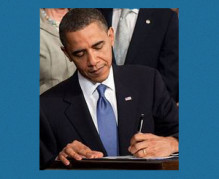On the cusp of the July 4 holiday weekend, President Obama quietly announced (via an underling’s blog post) that he had unilaterally chosen to delay Obamacare’s employer mandate—its requirement that businesses with 50 or more workers provide federally approved health insurance. Obama claims to possess the legal authority to choose not to execute this aspect of the law that he spearheaded and signed, despite the fact that Obamacare’s text declares that the Shared Responsibility for Employers Regarding Health Coverage provision, commonly known as the employer mandate, “shall apply to months beginning after December 31, 2013.”
That’s almost exactly the same language that Obamacare uses to refer to the starting date for its budget-busting exchange subsidies. The Congressional Budget Office estimates that, over the next ten years, Obamacare would funnel a colossal $1.212 trillion from American taxpayers, through Washington bureaucrats, to insurance companies—the ultimate recipients of those subsidies. Obamacare’s text states that the subsidies “shall apply to taxable years ending after December 31, 2013.”
So, if Obama can unilaterally decide not to execute Obamacare’s employer-mandate provisions (which “shall apply to months beginning after December 31, 2013”), does this mean that a future Republican president can unilaterally decide not to execute its exchange-subsidy provisions (which “shall apply to taxable years ending after December 31, 2013”)? If Obama can grant himself what Nebraska Senate hopeful Ben Sasse calls a de facto “line-item veto” over parts of an existing law, then couldn’t a future Republican president grant himself that same power and wield it over different parts of that same law? If Obama isn’t constrained to execute laws as written, wouldn’t a future GOP president enjoy similar liberties?
If Obama isn’t constrained to execute laws as written, wouldn’t a future GOP president enjoy similar liberties?
In truth, if a future Republican president were to claim to have the authority to choose not to execute Obamacare as written, it would represent an egregious violation of the public trust, the presidential oath, and the separation of powers. The most essential power or duty that the president possesses is one that we generally (perhaps too casually) take for granted: his constitutional responsibility to “take Care that the Laws be faithfully executed.” The first line of Article II (the Constitution’s executive article) reads, “The executive Power shall be vested in a President of the United States of America”; the full executive power is vested in just one person. If we elect a president who doesn’t take seriously his responsibility—his duty—to execute the laws as written, then the Constitution affords us little recourse (at least short of impeachment). In this way, both the Constitution and the citizenry put an extraordinary level of trust in just one man.
If a future Republican president were to claim to have the power not to pay out Obamacare’s taxpayer-funded exchange subsidies—the power to delay that portion of the law for whatever period of time he chose and thereby effectively change the law — it would be a gross abdication of duty. If that were to happen, hopefully that Republican president would not threaten to veto as “unnecessary” subsequent legislation to amend the law and grant the delay that he or she sought, thereby restoring the rule of law. And hopefully he or she wouldn’t say something like this:
Well, this was a very practical decision that actually doesn’t go to the heart of us implementing [Obamacare]. . . .
I will seize any opportunity I can find to work with Congress to strengthen the middle class, improve their prospects, improve their security…but where Congress is unwilling to act, I will take whatever administrative steps that I can in order to do right by the American people.
And if Congress thinks that what I’ve done is inappropriate or wrong in some fashion, they’re free to make that case. But there’s not an action that I take that you don’t have some folks in Congress who say that I’m usurping my authority. . . . But ultimately, I’m not concerned about their opinions—very few of them, by the way, are lawyers, much less constitutional lawyers.
I’m not just going to sit back . . . and twiddle my thumbs.
© 2013 by The Weekly Standard. Reprinted by permission.
Photo Credit: Pete Souza derivative work: SusanLesch (Obama_signs_health_care-20100323.jpg) [Public domain], via Wikimedia Commons
